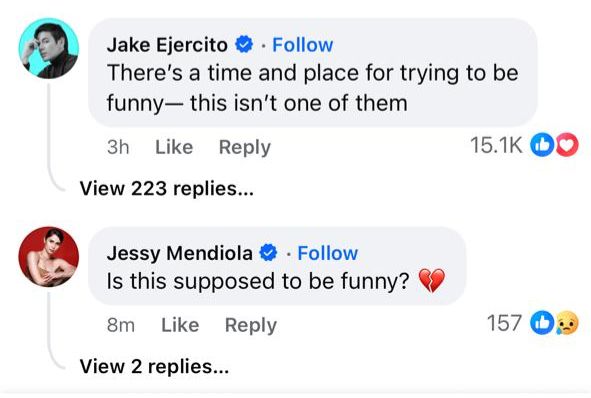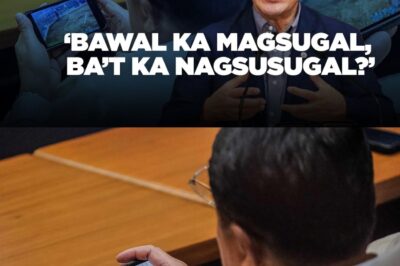When classes are suspended, students and parents expect clarity—not comedy. But what happens when a government agency tries to be funny during a weather emergency? That’s exactly what unfolded on July 22 when celebrities Jake Ejercito and Jessy Mendiola called out the Department of Interior and Local Government (DILG) for its informal class suspension announcement. The backlash was swift—and loud. Is this just another internet moment, or a serious sign that public communication needs to grow up?
DILG Class Suspension Post Sparks Outrage

The controversy began when the official DILG Philippines Facebook page posted an update on class suspension due to the southwest monsoon or habagat. But instead of a formal advisory, the announcement came with a cheeky caption:
“Mga Abangers, sarap ng bogchi ko. Sa kabusugan ay naka idlip nang sandali. Oh eto na inaabangan ninyo.”
In English: “To those waiting for the suspension, I had such a nice meal I dozed off. Here’s what you’ve been waiting for.”
The post also displayed a graphic featuring the name of DILG Secretary Jonvic Remulla, known for his laid-back communication style. However, in this situation, many believed the message crossed a line.
Jake Ejercito: “There’s a Time and Place for Humor—This Isn’t It”
Actor and social commentator Jake Ejercito didn’t mince words. Under the DILG post, he left a comment that quickly went viral:
“There’s a time and place for trying to be funny—this isn’t one of them.”
Jake, known for his roles in “Can’t Buy Me Love” (2023) and “GG: Good Game” (2024), is no stranger to speaking out on social issues. His criticism highlighted the sentiment of many netizens who saw the announcement as unprofessional and insensitive, especially during a time of flooding, uncertainty, and school disruptions.
Jessy Mendiola Questions the Joke: “Is This Supposed to Be Funny?”

Jessy Mendiola, who recently returned to television in the series “Sins of the Father,” also called out the post, simply asking:
“Is this supposed to be funny?”
Her brief comment underscored what thousands of people were thinking. For many, the situation wasn’t something to laugh about. Schools across affected areas were in limbo, parents were seeking clarity, and yet the official announcement sounded more like a meme than a message.
Why This Class Suspension Post Went Too Far
While some praised the DILG for having a relatable voice, others emphasized that official communication—especially during emergencies—should maintain a level of seriousness and respect. The casual tone may have been on-brand for Secretary Remulla, but critics argue that turning class suspensions into a joke was out of touch and disrespectful.
Many commenters on Facebook described the announcement as tone-deaf, particularly for a department tasked with ensuring public safety. In times of crisis, they said, professionalism must come first.
DILG Remains Silent Amid the Backlash

As of writing, the DILG has not responded to the backlash or clarified whether Secretary Remulla personally approved the post. Earlier this year, Remulla confirmed that his department was responsible for issuing class suspension announcements during typhoons and extreme weather, a role delegated to him by the Presidential Communications Office.
This silence has only fueled further frustration among netizens who believe the agency should acknowledge the criticism and take steps to improve how it handles public advisories.
Social Media Backlash: More Than Just a Viral Moment?
This incident raises broader questions about the role of social media in public service. As government agencies lean into digital platforms to disseminate information, the line between being “relatable” and being “respectful” becomes increasingly thin.
The DILG may have aimed for engagement, but in doing so, they may have undermined public trust. Citizens are looking for clear, direct, and timely updates—not comedy routines.
So, What Happens Next?
Will the DILG revise its communication strategy in the wake of this criticism? Will officials, including Secretary Remulla, recognize the need to balance tone with accountability? And how will the public respond if such posts become the norm?
What started as a lighthearted update has now become a flashpoint in a larger conversation about professionalism in government messaging. With voices like Jake Ejercito and Jessy Mendiola speaking up, the pressure is on for the DILG to reflect and act.
Conclusion: More Than Just a Meme Moment
Jake Ejercito and Jessy Mendiola didn’t just criticize a Facebook post—they triggered a national conversation. Public service, especially in times of uncertainty, demands more than just attention—it demands responsibility.
As more Filipinos look to social media for life-impacting updates, government agencies must ask themselves: Are we here to inform—or entertain?
This class suspension controversy is a clear reminder that when the message matters, the messenger must take it seriously.
News
Secret No More: Gerald Anderson and Gigi De Lana’s Private Wedding in Batangas Breaks the Internet – Here’s What You Missed!
Did Gerald Anderson and Gigi De Lana just get married in secret? Yes — and the internet can’t keep calm….
“She Was Gone for Minutes”: Mona Alawi Found Unconscious, Ivana Alawi in Tears – What Really Happened?
In a moment that shocked fans across the globe, Mona Alawi, the beloved younger sister of actress and YouTube star…
Hanggang sa Muli, Mahal Kita’: Why Rufa Mae Quinto’s Heartbreaking Farewell to Her Husband Is the Story You Can’t Ignore
Filipino actress and comedienne Rufa Mae Quinto is grieving the unexpected passing of her estranged husband, Trevor Magallanes, and the…
Jo Koy Blessed by Tattoo Legend Whang-Od: The Viral Moment Everyone’s Talking About!
Why did Jo Koy travel all the way to the remote mountains of Kalinga? What really happened during his visit…
Caught Red-Handed: Congressman Busted Watching E-Sabong During House Session – Tulfo Weighs In!
In a moment that sent shockwaves through the online community and the halls of Philippine politics, a congressman was caught…
Claudia Barretto Breaks Silence: The Real Reason Behind Julia and Gerald’s Breakup – You Won’t Believe What She Revealed!
When celebrity couples part ways, the public is often left in the dark—guessing, speculating, and waiting for answers. But not…
End of content
No more pages to load












